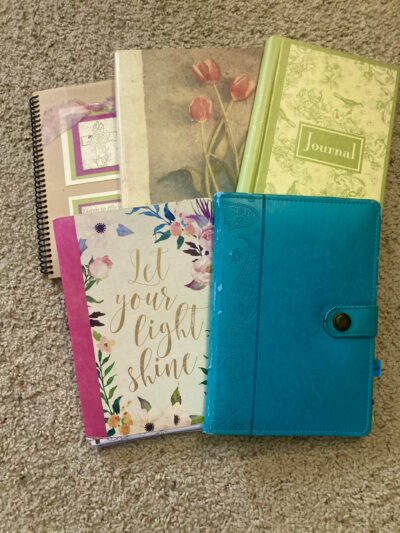Would you like to improve your mental, emotional, and spiritual health this year?
Try journaling what you are struggling with, topics you’re praying about, unexpected blessings, and the times you feel closest to God. By keeping a written record of your spiritual progress and your journey in getting to know the heart of God, journaling becomes a form of self-therapy…or perhaps even soul-therapy.
There are no rules to journaling. It’s okay if you skip a day or two or even a week. It’s okay if you only write when inspired. It’s fine if it’s done on the keyboard in an open file on your computer or voice-texted into the notes section of your phone. I prefer the romance of writing by hand with a nice pen in a pretty-looking blank book. It’s okay if no one ever reads it but you—or if you use what you’ve recorded to share with someone else, or if you go back one day through much of what you have written and eventually decide to publish it for others.
Because there are no rules or drawbacks, and because there are so many benefits, here are just three reasons to begin – or continue – journaling:
- Journaling teaches you how to converse with God.
So much of our prayer life can tend to be one-sided. If you are one to tell God what’s on your mind, what you need, and what you wish He’d do, and then go about your day, journaling your prayers or thoughts is one way to start a two-way conversation with God. When you take the time to record, type, or write out your thoughts or prayers, it takes a little longer…slowing you down, making you more intentional about what you pray, and in the process it quiets your heart so you can begin to listen.
I have found that as I take the time to write out my prayers, God often convicts my heart about certain things, or gives me insight, and then it’s as if the Holy Spirit is guiding me in the words to write and pray. It’s one way I can hear His voice (instead of just my own) during prayer.
I find that I can more easily stay focused while praying when I take the time to write it out. Of course, spontaneous prayer still happens throughout the day, but taking time to journal your prayers can cause you to be more intentional about prayer and open to hearing what God has to say, as well.
- Journaling helps you maintain focus during your Bible-reading.
Our minds can easily wander as we read God’s Word. Or, sometimes we might read just to check another box off of our to-do list in the morning. Journaling helps you engage with God’s Word by writing out a verse and letting it sink into your heart. As you write a verse, you can put your name into it, prayerfully meditating on it with the goal of applying it to your everyday life.
I love personalizing the Psalms into prayers of petition and praise. (That’s one way to pray through the Word of God.) I give each day’s journal entry a title and sometimes that day’s journal entry becomes a devotional moment I share with someone or include in a written article or a study I’m teaching. Even if all it does is teach you something, you are recording what you’re learning and staying focused on the Word and your time with God in prayer.
- Journaling is a healthy way to vent with God.
Writing out what you’re thinking, learning, and praying gives expression to what is going on in your heart so you don’t erupt into a rant with others. If you tend to be an over-communicator (I can relate), it can keep you from saying too much to others, wearing out their ears, or verbally processing what might be better to quietly ponder in your heart—or on the pages of a journal.
Are you struggling with why God is allowing something? Write it out, in a personal conversation between you and God, on the pages of your journal. It’s likely that as you write, the answers may come to you from Scripture if you’re familiar with it. If not, write verses that you’re struggling with and ask God about them, too.
In Psalm 73, we learn that Asaph didn’t understand why the wicked seemed to be prospering. He had many questions of God and was disillusioned in his faith. But then he realized if he told others the confusion he was dealing with and verbalized his disillusionment, causing them to question God as well, that would be a greater offense than taking His questions to God and resting in Who God is. In verse 15 Asaph said, “If I had spoken out like that, I would have betrayed your children” (NIV). Then, he worked it out by entering God’s presence. In verse 17 he said, “Then I went into your sanctuary, O God, and I finally understood…” (NLT).
You can go into the sanctuary of your journal and pour out your heart to God and experience the truth of Psalm 62:8 “Trust in Him at all times…Pour out your hearts before Him; God is a refuge for us” (NASB).
Which of these benefits do you most need in your life right now? Would journaling help? I’d love to hear your thoughts in the comment section below.
For practice in journaling, read and go through the reflection questions in Cindi’s books, Letting God Meet Your Emotional Needs, Women on the Edge, or When a Woman Overcomes Life’s Hurts.





Cindi, what a beautiful explanation of how to journal.
I felt a wonderful, loving peace as I read your words.
You opened my eyes to what journaling can do for us.
I was truly blessed!
Thank you Cindi
You’re welcome, Elizabeth. Thank you for reading it and expressing such kind, encouraging words.
Hi Cindi! This subject as you know is something I’ve done for years. I have journals back to 1998. In the past few years I’ve gotten more creative. If I hear a quote that I like, it is written down. If I read something from a book I copy and paste it into my journal. If I doubt His about anything like his love for me, I let him know, and when he shares His thoughts with me, again I write them down. It is good therapy. Thank you for sharing this here.
Ramona, I’m glad you’ve found journaling as good therapy, too. I, too, often write down quotes, and who said them, and other impactful things I read or hear…it makes my journal a record of spiritual progress through the year(s). Thanks for sharing what works for you. 🙂
I’ve been writing in journals since I was a teenager for all the reasons you shared. When a fire almost took out our house in 2020, I realized all those journals would be lost. I went through all of them and typed them up, creating word documents/file folders for them. Now they will be preserved should anything happen.
How powerful to go back and read through my deepest, most inner thoughts – anguish, despair, grief – and see how God moved through my life and blessed me. What a great experience to remember all God has done in my life. I now type up my journal in a running document.
Thank you, Lorraine, for sharing what journaling has meant to you through the years…and your idea for preserving them! Yes, what a great experience to remember what God has done in our lives; it gives us confidence that He will continue to be our Deliverer, Protector, and Comforter.
Hi, Cindi,
Googling the presence of God and I came across your blog. Nice to meet you! My journaling has changed over the years. Now I am focusing more on connecting to my feelings and emotions, rather than just venting to God or talking about my day and my problems. Journaling helps us to grow spiritually by helping us connect more to ourselves and God at a deeper level. It also helps me become more aware of repetitive patterns in my life and how God intervenes in my daily life. Thanks for this post. Keep looking up!
Hi Ariel, thanks for leaving your comments. I’m glad you found my blog and am glad to hear how journaling is working for you in helping you connect deeper with God and understand yourself more fully. Blessings to you.